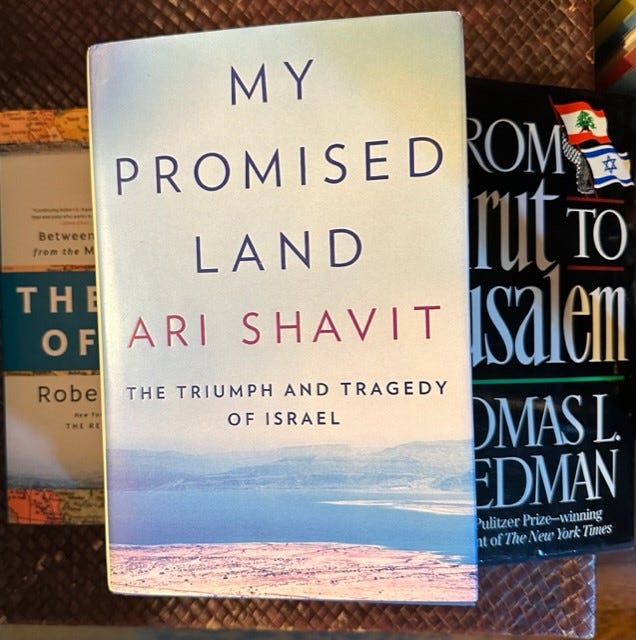Israel's 9/11
Books that may provide some perspective ...
Home from a long trip filled with different voyages and different readings, I spent last Thursday thinking through a newsletter emphasizing the Cheat Sheet section of my site where I have uploaded marginalia from long but important history books. This embryonic letter ended on October 6th as Israel plummeted into its version of 9/11. Like our September nightmare of 22 tears ago, the event will provoke, understandably, further violence, horrors, and hate. Also, like New York’s day of terror, it will change things irrevocably, not just in Israel and Gaza, not just in the Middle East, but in the world. I remember listening ad nauseum to the 2001 pundit refrain that “the world will never be the same” and thinking that this might be a bit hyperbolic. Certainly the 22 years since have proved me wrong. We live in an entirely different world and while the rise of China, climate change and the “challenges” of technology were coming our way with or without 9/11, America’s radically more insecure place internationally and domestically can, in large part, be traced to a shift in our nation’s fate thanks to the events on that brilliantly clear September morning.
It is not my place to play the pundit and go beyond this point. This is the world of Heather Cox Richardson (Substack), Noah Smith (Substack) and Ravi Agrawal (FP Editor in Chief & son-in-law). By the way, with the exception of David Brooks (NYT), George Packer (The Atlantic Monthly) and Ed Luce (FT), the first list of three are increasingly the only sources of analysis that consistently qualifies in my 68-year-old mind as “spot-on”. My contribution is, more appropriately, books. The following are FOUR books from my bookshelves that resonated with me as I followed this tragic and clearly historical moment. They fit because they provide different contextual paradigms within which to think.
1).
My Promised Land
The Triumph and Tragedy of Israel
Ari Shavat 2013
Popular, bright and controversial, this Israeli journalist and writer and recent casualty of MeToo, wrote a colorful, moving and candid ‘history’ ten years ago that was the first book I thought of as events unfolded . His journey through the brief history of Israel captures all that had led us to this moment. Israel has always been a dreamscape of many colors in conflict with a violent reality both within and without. Starting with the orange groves of the kibbutz and proceeding to the Iron Dome and the West Bank settlements, this is a story that reads like a novel. Israel never felt the same to me after reading it. It has never felt more relevant.
2).
The Loom of Time
Between Empire and Anarchy, from the Mediterranean to China
Robert Kaplan 2023
Years ago I argued that the loss of the Ottoman Empire was an historical tragedy that the Middle East may never recover from. This provocative conversation starter (or killer) is only a small part of Kaplan’s book but is pretty much its North Star. The violence we have just witnessed, the geopolitical confusion and the sense of anarchy unleashed are all consequences of events shaped by centuries of cultural history and identity in collision with modernity. This is GREAT stuff and so spookily relevant. I will write a long Cheat Sheet on this book later this fall and will berate you to read it. The empire vacuum thesis is popular (and for good reason) and the other history book to read that argues quite persuasively about the dark consequences of an empire free world is Robert Kagan’s recent The Ghost at the Feast. While Kagan’s book is about 20th century America, the geopolitical reality is that America served for over fifty years as the region’s distant Ottoman Empire. She inherited, influenced and inflamed the post WWII Middle East and, even now, as her carriers approach Israeli waters, it is entirely appropriate that the horrors of this October were referred to by all parties as Israel’s 9/11.
3).
From Beirut to Jerusalem
Thomas Friedman
1989
A young Thomas Friedman writing like an angel! By far the best book he has written, From Beirut to Jerusalem is definitely dated. In fact, it is now a widely respected “history” book having migrated over 34 years from Current Affairs to Middle Eastern History. Hamas is not in the Index. Regardless, all that is tearing asunder the Middle East today was there in one form or another in the Beirut and Jerusalem Friedman so brilliantly describes. This book is my oldest and maybe widest tree ring in my limited Middle East readings.
4).
To the End of the Land
David Grossman
2011
There is too much fiction in all forms on the subject of Israel, Palestine and the Middle East and too much of it I have not read. This is a great book by a great writer. It is not easy but neither is the subject. A son goes to war with the IDF and takes leave to take an existential walk with a Toni Morrison like mother through Galilea. Through art, we are immersed in the emotional minefield that is today’s Israel.
I will return fairly shortly to a less topical newsletter shortly … I hope.


